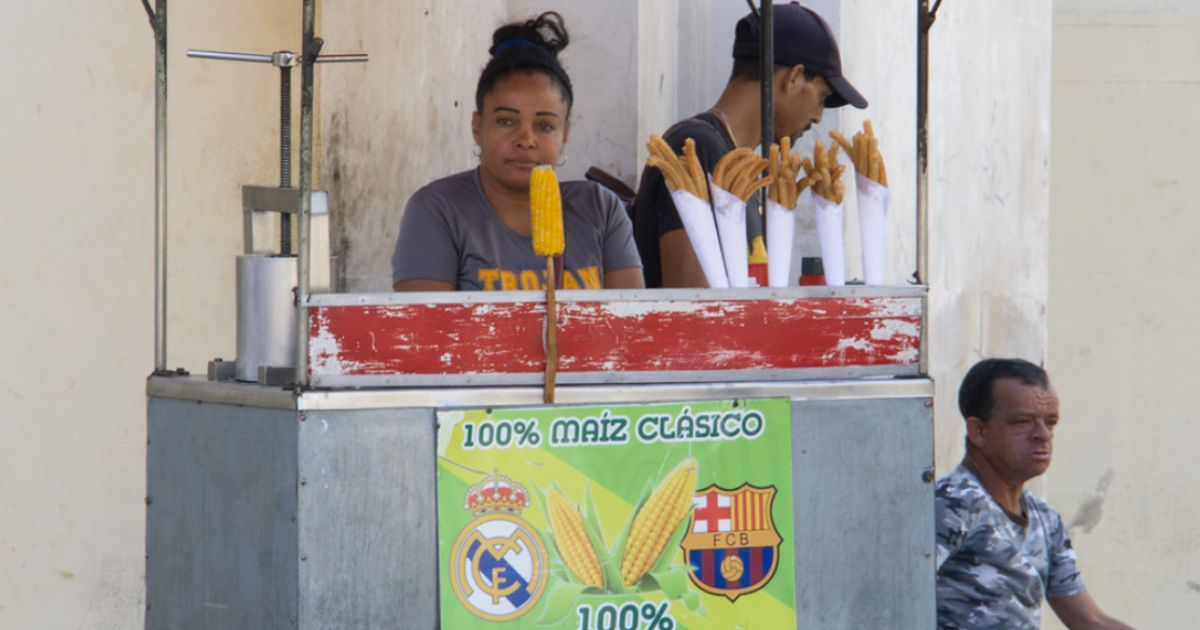
Related videos:
Luis Mario Jerez Estrada, a resident of the city of Bayamo in Granma province, reported on social media this Tuesday that he was fined 16,000 pesos for doing his job, despite claiming that he has all the necessary paperwork in order and pays taxes to the Cuban government.
“Things of life, what a curse it is to live in a country where working is a crime,” he wrote on his Facebook profile, where he recounted the incident with officers from the National Revolutionary Police (PNR), who allegedly accused him of being “illegal,” despite presenting his documentation.
Jerez mentioned the police harassment faced by self-employed workers, stating that in Cuba "it yields better results to go out at night, assault and kill someone to steal a phone or something of value, than to work honestly."
The young man warned that he could face reprisals for making the situation public, such as having his mobile phone confiscated or other sanctions, but he still decided to report what had happened.
"I don't care about that; what I can't do is let that incident go by without reporting it," she expressed.
His testimony reflects the growing discomfort among many Cubans who are trying to survive through economic activities outside the state system, in a context of crisis, inflation, and limited formal employment opportunities.
In the comments section, numerous people expressed their outrage at what happened, while others pointed out that this kind of situation is becoming increasingly common in Cuba.
Yordanis Perdomo Leyva expressed: “This is the harsh reality of our daily lives, and every night they go out criticizing other countries for their problems, when the biggest problem lies here, among ourselves.”
“Afterward, the people speak, and the communists claim that they are against the government, not realizing that it is the government that is against the people,” emphasized Adrián Zamora.
Arletis Mojena emphasized, “That is the harsh and sad reality experienced in Cuba, as the song says, ‘Cuba needs a change and that change is now.’”
In recent years, complaints on social media about injustices in Cuba have intensified, many of which are led by ordinary citizens seeking to shed light on critical situations.
In 2024, a woman residing in Las Tunas reported the alleged .
According to his testimony, after posting the message, State Security agents attempted to coerce him into removing it, and hours later, the police arrived at his home with a search warrant and took the young man into custody.
That same year, a Cuban identified as Sairis Castillo, published a video in which she refuted the official narrative that downplays the crisis on the island.
In his message, he expressed that the blackouts, the scarcity of food and medicine, and the lack of political freedoms are more than sufficient reasons for the people to protest. His testimony gained attention due to the emotional force with which he denounced the everyday precariousness of Cubans and the widespread feeling of living in a constant state of survival.
The case of Roelbis, a boy from Camagüey who sold tamales to help his grandmother, generated a wave of solidarity last September after being shared on social media by independent journalist José Luis Tan Estrada.
The boy, known as "Titingo," managed to capture the attention of numerous users who organized donations to prevent him from having to continue working on the street.
In October, outrage ignited again following the seizure of trucks with food belonging to farmers in Santiago de Cuba. The complaint was made by journalist Yosmany Mayeta Labrada on his Facebook profile.
The posts sparked an intense debate about the lack of institutional support for the Cuban agricultural sector, and many users in the comments criticized the police actions, highlighting that while the people suffer from hunger, authorities obstruct access to food.
Frequently Asked Questions about Police Harassment and Repression in Cuba
Why was Luis Mario Jerez Estrada fined in Cuba?
Luis Mario Jerez Estrada was fined 16,000 pesos by Cuban authorities despite having the proper documentation to legally carry out his work. The fine reflects the police harassment faced by self-employed workers in Cuba, where the regime often targets those trying to make a living outside the state system.
How does police harassment affect self-employed workers in Cuba?
Police harassment in Cuba severely impacts self-employed workers, who suffer excessive fines and confiscations, hindering their ability to earn income and support their families. These repressive actions prevent the economic development of self-employed individuals and reflect the government's lack of support for private entrepreneurship in a context of economic crisis.
What is the significance of social media in reporting abuses in Cuba?
Social media plays a crucial role in denouncing abuses and police harassment in Cuba. Platforms like Facebook allow citizens to share their experiences and generate debate about the injustices they face, increasing pressure on the government to take action.
How is Cuba's economic situation related to the harassment of self-employed workers?
The economic crisis in Cuba, marked by high inflation and limited opportunities for formal employment, forces many Cubans to seek economic alternatives outside the state system. However, harassment and fines imposed on self-employed workers make their survival difficult, further exacerbating the economic situation of families and limiting personal and professional development opportunities on the island.
Filed under: